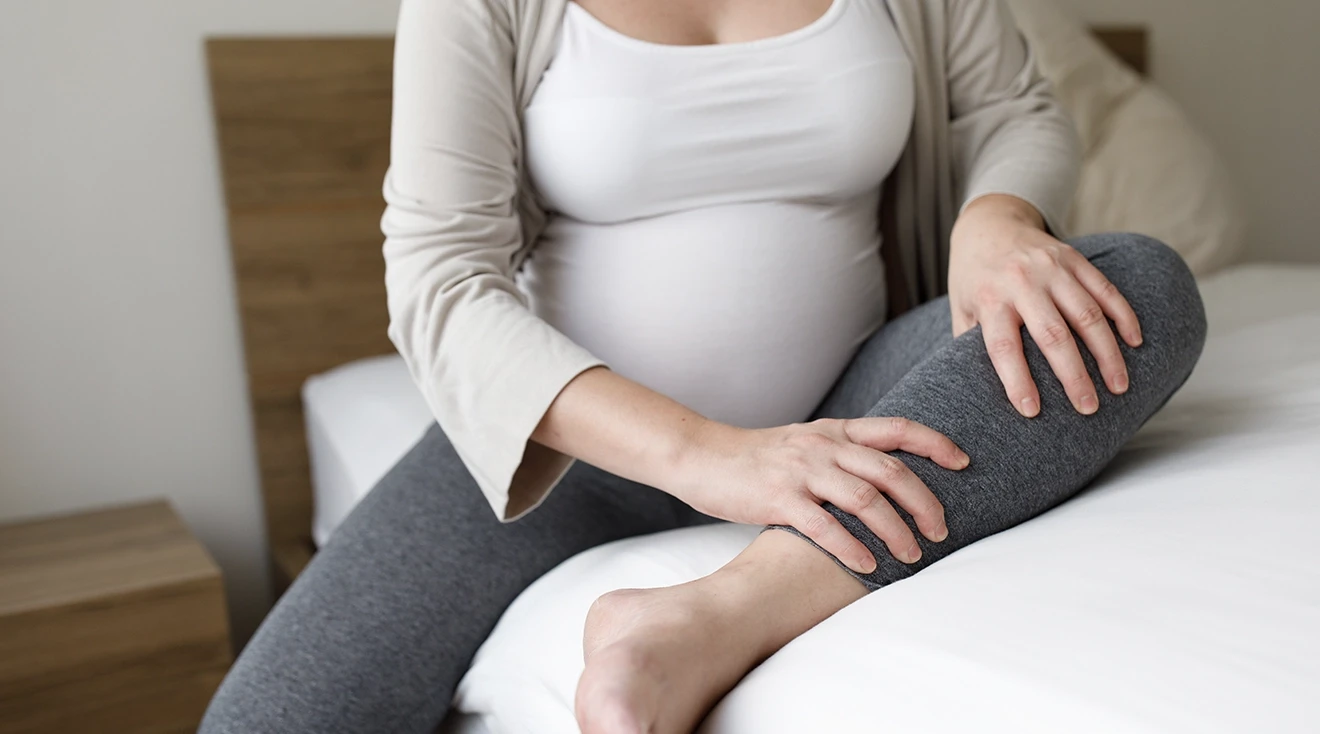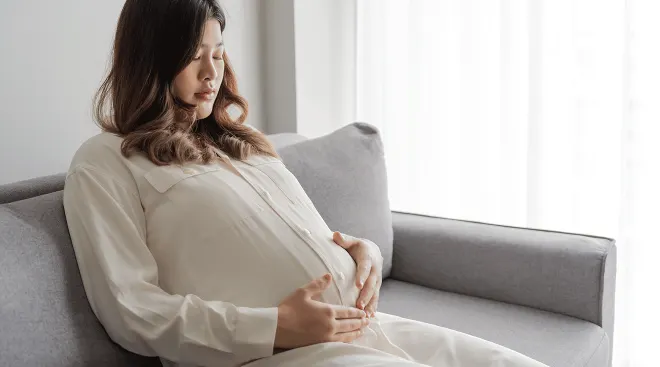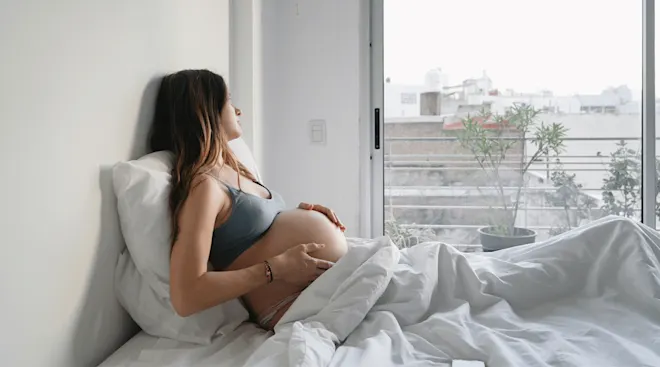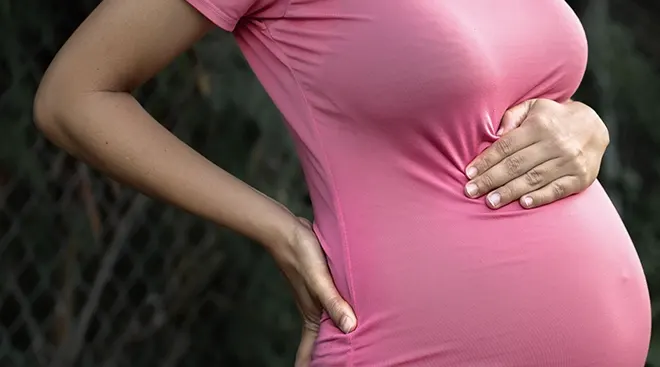How to Ease Leg Cramps During Pregnancy
Pregnancy is filled with all sorts of weird aches, pains and discomforts. Unfortunately, experiencing leg cramps during pregnancy is just par for the course. They can spring out of nowhere and stop you in your tracks, or even wake you up at night (and we all know how precious sleep is when you’re expecting). So what’s the deal with these unpleasant charley horses? Here’s why you might be experiencing leg cramps, what you can do to ease the pain in the moment and how to lower the odds of dealing with them again in the future.
For the record, yes, you’re not the only one dealing with this. Nearly half of all women experience leg cramps during pregnancy at some point, and they tend to spring up at night, according to the American Pregnancy Association. “It’s common—a lot of my patients report experiencing them,” says Christine Greves, MD, a board-certified ob-gyn at the Winnie Palmer Hospital for Women & Babies in Orlando, Florida.
While plenty of moms-to-be have leg cramps, the level of discomfort can vary, ranging from annoying to outright debilitating. “Cramps can cause women loss of sleep and reduced well-being and work capacity,” says Jessica Shepherd, MD, an ob-gyn at Baylor University Medical Center in Dallas, Texas.
While you can technically have leg cramps at any point during your pregnancy, they’re more common in the second and third trimesters. The cause, however, is a little less clear. “We’re not really sure why leg cramps happen in pregnancy,” says Julie Lamppa, APRN, CNM, a certified nurse midwife at the Mayo Clinic. But she says there are some theories.
One is that it may be due to muscle fatigue or a build-up of certain acids (like lactic and pyruvic acid) that cause your muscles to involuntarily contract, leading to those painful cramps, Greves says. Pregnancy weight gain puts more work on your legs than when you’re not pregnant, and that can also increase your risk of cramping, she explains.
You’re also at more risk of becoming dehydrated when you’re expecting, which may be a factor in those leg cramps during pregnancy, Shepherd says. When your body doesn’t have enough water or sodium, she explains, your muscles can contract and prompt that cramping feeling. Compression of certain nerves in your legs, your joints relaxing as your pregnancy progresses, swelling and “natural changes in your posture as baby grows,” also play a part, says Julie Lamppa, APRN, CNM, a certified nurse midwife at Mayo Clinic. Varicose veins, which can increase or show up during pregnancy, “can also cause leg discomfort for some women,” she adds.
A less common but concerning possible cause of leg pain during pregnancy is a blood clot or deep vein thrombosis (DVT). “This occurs most commonly in the back of the calf, and it causes pain and swelling in the affected leg,” Lamppa says. “This will affect only one leg, whereas normal swelling in pregnancy will generally be even in both legs.” If you notice signs of DVT, it’s important to seek medical attention right away. DVTs can be very serious and they need prompt treatment—and women who are pregnant or newly postpartum are at particular risk. DVTs can occur in either leg, but they’re much more common on the left side than the right side, says Frederick Friedman, Jr., an ob-gyn and associate professor at the Icahn School of Medicine at Mount Sinai in New York City. The reason for this is uncertain, but it might be due to greater compression of the left deep veins by your growing uterus.
Home Remedies for Leg Cramps During Pregnancy So what can you do when that familiar pain strikes? There are a few easy ways to help ease leg cramps during pregnancy:
- Flex your foot as soon as you feel the cramp coming on. “You want to point your toes up as far as you can bring them, like trying to bring your toes to your shin,” Lamppa says. She recommends holding this position until the cramp calms down.
- Elevate your leg. Try this after you flex your foot to help move things along, Greves says. Even better, try stretching and then elevating your leg.
- Walk it out. This can be a little tricky if you’re having an intense cramp, but movement can help, Lamppa says.
- Massage the cramp. Rubbing the muscle can help relieve the tension (and cramping), Lamppa says.
If those remedies don’t work, acetaminophen (Tylenol) is considered safe during pregnancy, Lamppa says. She also suggests talking to your doctor about taking a magnesium supplement.
If you’re having any of the following symptoms along with leg cramps during pregnancy, call your doctor:
- Persistent throbbing in one leg
- Leg swelling
- Redness in your leg
- A leg that’s warm to the touch
It’s always a good idea to at least mention leg pain to your care provider during your regular checkups, but it’s especially important to see your doctor if you have any pain that persists or gets worse. If you have a “sudden, significant difference in leg size” or you can see a “rope-like” structure in your calf, Friedman recommends calling your doctor right away, as these could be signs of DVT. That DVT could cause a pulmonary embolism, which is a blood clot that travels to and blocks a portion of your lungs—and it’s a life-threatening emergency.
In general, using “good body mechanics” when you’re walking, exercising and lifting is important, Lamppa says. “You don’t want to make pain worse by injuring your joints or pulling muscles,” she adds. Moving around can help work out the acids that can build up in your leg muscles, Greves says. Suffice it to say that you should also try to avoid sitting or standing for long periods of time.
While leg cramps are common during pregnancy, there are a few things you can do to lower your chances of getting them in the first place:
- Stretch your calf muscles. Stretching them out regularly (think: a few times a day) can help relieve tension in the area that can lead to cramping, Shepherd says.
- Stay physically active. Moving around can help work out the acids that can build up in your leg muscles. Exercising regularly is “almost always beneficial,” says Lamppa. While most forms of exercise can help with leg pain during pregnancy, leg exercises like walking, using a stair machine, stationary cycling and using an elliptical machine “are likely to be beneficial,” adds Friedman.
- Strive for a balanced diet. On the dietary side, Lamppa recommends lowering your sodium and caffeine intake.
- Take a warm shower or bath before bed. This can help relax your muscles.
- Drink plenty of water. This is important for pregnancy, in general, but can also help lower your risk of cramping, Lamppa says.
- Take a magnesium supplement. There’s some evidence to suggest this can help with leg cramps, Lamppa says. Most prenatal vitamins already contain some magnesium, but you can talk to your doctor about whether you might benefit from additional supplementation.
If leg cramps during pregnancy are a regular thing for you, talk to your doctor. They should be able to help guide you on next steps.
About the experts:
Frederick Friedman, Jr., MD, is an associate professor of obstetrics, gynecology, and reproductive science at the Icahn School of Medicine at Mount Sinai in New York City. He serves as director for both the division of obstetrics and the division of generalists in the department of obstetrics, gynecology and reproductive science at the Mount Sinai Health System.
Christine Greves, MD, is a board-certified ob-gyn at the Winnie Palmer Hospital for Women & Babies in Orlando, Florida. She received her medical degree from the University of South Florida in Tampa.
Julie Lamppa, APRN, CNM, is a certified nurse midwife at Mayo Clinic in Rochester, Minnesota.
Jessica Shepherd, MD, is an ob-gyn at Baylor University Medical Center in Dallas, Texas. She received her medical degree from the Ross University School of Medicine in Miramar, Florida.
Please note: The Bump and the materials and information it contains are not intended to, and do not constitute, medical or other health advice or diagnosis and should not be used as such. You should always consult with a qualified physician or health professional about your specific circumstances.
Plus, more from The Bump:
Navigate forward to interact with the calendar and select a date. Press the question mark key to get the keyboard shortcuts for changing dates.




















































